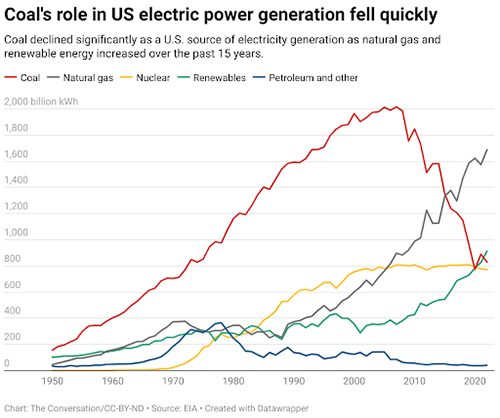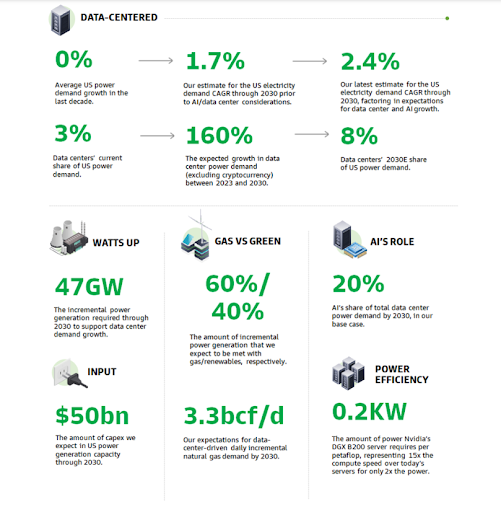Financial Times reported on May 30th that the US phase-out of coal fired electricity generation will be delayed due to the impact of growing loads driven by data-centres and in particular the energy demands associated with training machine learning models. According to the article:

“The staggering electricity demand needed to power next-generation technology is forcing the US to rely on yesterday’s fuel source: coal. Retirement dates for the country’s aging fleet of coal-fired power plants are being pushed back as concerns over grid reliability and expectations of soaring electricity demand force operators to keep capacity online.”
The Financial times article ends on a somewhat encouraging note: Coal’s eventual decline is sealed. It has declined significantly already and the trend (if not the pace) seems secure.

Still — the projected impact of data centres on the availability and reliability of power on the US grid is something to behold.
Goldman Sach research summarizes this neatly in a report focused on the topic:
The infographic below reveals a startling statistic: Goldman projects growth from 3% today to 8% of all US power demand to arise from data-centre loads in the blink-of-an-eye timeframe: 2030. (And this against the backdrop of an overall growth in electricity demand of 2.4% in the same period.)
 That brings us back to phasing out coal and the observation that the pace actually does matter — and for reasons that have to do with more than just decarbonization.
That brings us back to phasing out coal and the observation that the pace actually does matter — and for reasons that have to do with more than just decarbonization.
The human health impacts of fine-particle particulates from coal plants are a driver of adult morbidity and premature mortality as The Conversation reports.
But there’s more. It turns out that digging up toxic metals like lead and mercury, combusting them along with coal and allowing the emissions to drift across a countryside with children’s young brains developing under those plumes — well it’s not the best for cognitive development:
For reasons that deserve reflection on all sides, this moral issue is caught up in hand-wringing over the scope of economic impact of the developmental harm caused to these children. For instance this:
Or this:
“Using national blood mercury prevalence data from the Centers for Disease Control and Prevention, we found that between 316,588 and 637,233 children each year have cord blood mercury levels > 5.8 μg/L, a level associated with loss of IQ. The resulting loss of intelligence causes diminished economic productivity that persists over the entire lifetime of these children. This lost productivity is the major cost of methyl mercury toxicity, and it amounts to $8.7 billion annually (range, $2.2–43.8 billion; all costs are in 2000 US$). Of this total, $1.3 billion (range, $0.1–6.5 billion) each year is attributable to mercury emissions from American power plants. This significant toll threatens the economic health and security of the United States and should be considered in the debate on mercury pollution controls.”
To summarize, in the words of a 2022 article in The Conversation:
“Mercury is a neurotoxic metal that can cause irreparable harm to human health – especially the brain development of young children. It is tied to lower IQ and results in decreased earning potential, as well as higher health costs.”
As you may have already gathered from the choice of public health researchers to drape their findings in economics, the regulation of mercury emissions from coal fired power generation plants, has become politically polarized. The last two US Presidents, have reversed their predecessor’s policy on the issue. Since the next US President will be one of those last two, there’s a non-zero chance of more policy churn to come.
—
To conclude: let’s pull these threads together.
- The “AI” boom is reshaping grid loads dramatically, and is projected to drive demand growth on a US grid that has not yet weaned itself of coal as a generation source.
- The phase out of coal is being delayed as a result.
- The emissions of coal include climate-forcing greenhouse gasses, small particle emissions that cause premature death in adults and heavy metals that cause brain damage in children.
- The regulation of emissions measures at coal fired generation plants is politically polarized.
So will AI make us stupid? Not necessarily. But if we make stupid choices on how we power it, yes, it very likely will.
